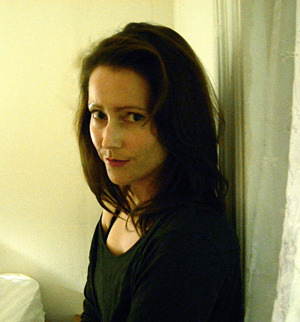Blurring the Lines: An Interview with Michelle Orange
 Last month I read a book by David Foster Wallace for the first time. (Dare I admit that? Not having read DFW is practically a sin in most literary circles; it was something that embarrassed me for years.) I finally read the essay collection A Supposedly Fun Thing I’ll Never Do Again. When I finished the book, I was greedy for more essay collections in which the author gets me to read about something I didn’t realize I had any interest in.
Last month I read a book by David Foster Wallace for the first time. (Dare I admit that? Not having read DFW is practically a sin in most literary circles; it was something that embarrassed me for years.) I finally read the essay collection A Supposedly Fun Thing I’ll Never Do Again. When I finished the book, I was greedy for more essay collections in which the author gets me to read about something I didn’t realize I had any interest in.
Michelle Orange’s This is Running for Your Life is exactly what I was looking for. While the author deserves comparisons to DFW and John Jeremiah Sullivan, she has her own distinct voice. Orange’s prose is animated by her innate curiosity and her convincing meditations on culture and her own life. I recently interviewed her via e-mail.
I was struck by the essay about your grandmother, in which you talked about the many ticket stubs she sent you on which she had scrawled short reviews. Movies, it seems, are more than a personal pleasure. It’s almost as if you genetically inherited the desire to watch cinema, to immerse yourself in the stories. Did you become a film critic partially because of your relationship with your grandmother?
There does seem to be something passed down about that kind of movie love, although in this case it skipped a generation—my mom is more of a special-event moviegoer. My father, though, is at least as devoted a movie-lover as my grandmother was, so I had it coming from several directions. What I sensed with my grandmother is that she seemed to need the movies as much as she loved them. Our trips to the Cineplex, where she would take seven-year-old me to see rated-R-for-mature-content movies like Night Shift, were the only time we spent alone together. They were memorable for that alone, but I think they embedded some of that need in me as well. She wasn’t interested in talking about a movie afterward. The pleasure was really in discovering and rediscovering that private response. Which is what made the ticket stubs so special to me—her effort to connect through this thing that we both loved so privately.
In “The Dream Girl Is Over,” you posit, “What if all life, but especially the part of it that involves consuming art and images, is in some sense a reminder?” Do you think that’s why those of us who are drawn to art, in whatever form we consume it, find some sense of recognition and familiarity in the work that we love?
There’s nothing better than encountering a voice that seems to have been living in your head, waiting for a microphone, or an interlocutor. It’s a feeling of being called. When art can make that connection it couldn’t be more personal. Read More »
The Paris Review's Blog
- The Paris Review's profile
- 305 followers



